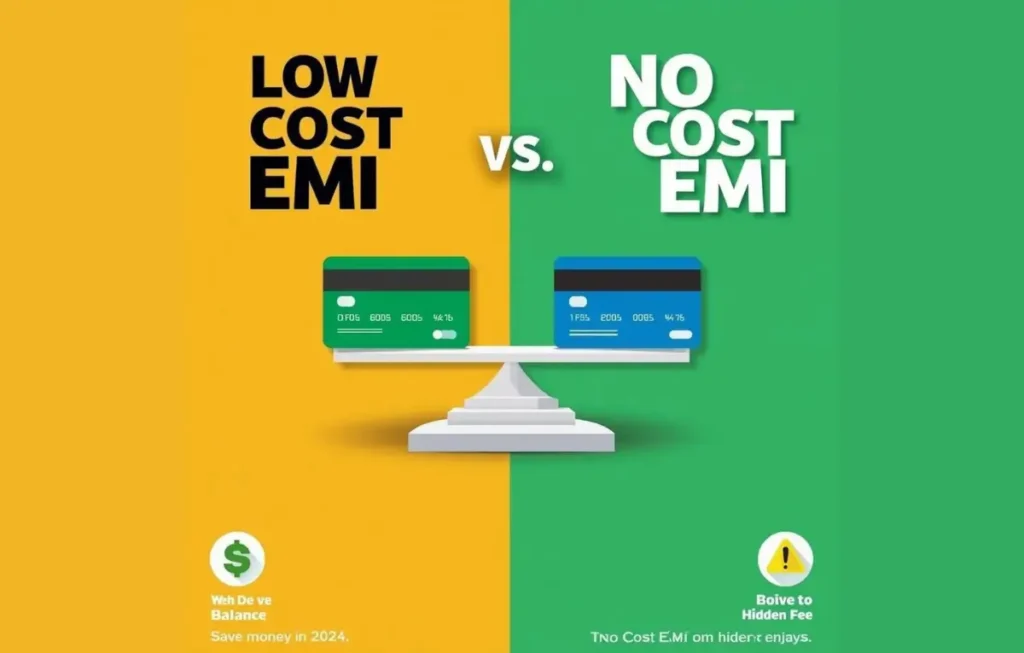Low-Cost EMI vs. No-Cost EMI: Which One Saves You More in 2024?
Discover the key differences between low-cost EMI and no-cost EMI options in 2024. Learn which financing option can save you more money and help you make informed purchasing decisions!
Understanding No-Cost EMI
No-Cost EMI, often referred to as zero-cost EMI or interest-free EMI, allows consumers to purchase products by paying in installments without incurring any additional interest charges. However, this term can be misleading as it does not always mean that there are no costs involved.
- How It Works: The total cost of the product is divided into equal monthly payments over a specified period. For example, if you buy a television for ₹1,00,000 and choose a 12-month repayment plan, your monthly payment would be ₹8,333.33.
- Hidden Costs: While marketed as interest-free, many no-cost EMI schemes may include hidden fees such as processing charges. These fees can inflate the overall cost of the product without being immediately apparent to the consumer[1][3].
Also Read : Tata Steel Share Price Target 2025-2030: Predictions and Insights
Low-Cost EMI Explained
Low-Cost EMI options typically involve lower interest rates compared to traditional loans but do not offer the same 0% interest benefits as no-cost EMIs.
- Interest Rates: Unlike no-cost EMIs, low-cost EMIs charge interest on the financed amount. This can lead to a higher overall payment when compared to no-cost options if not carefully evaluated.
- Flexibility: Low-cost EMIs may offer more flexibility in terms of product selection and repayment options since they are not restricted by the same promotional offers that often accompany no-cost EMIs.
Key Differences Between Low-Cost and No-Cost EMI
| Feature | No-Cost EMI | Low-Cost EMI |
|---|---|---|
| Interest Charges | 0% interest (but may have hidden fees) | Lower interest rates apply |
| Product Availability | Often limited to specific retailers | Wider selection of products |
| Repayment Structure | Fixed monthly payments without extra costs | Fixed monthly payments with interest |
| Eligibility Criteria | May require good credit score | Generally similar requirements |
| Transparency | Often lacks clarity on total costs | Clear breakdown of costs |
Also Read : IRFC Share Price Target 2025-2030: Full Forecast & Key Insights
Consumer Considerations
When deciding between low-cost and no-cost EMI options, consumers should consider several factors:
- Total Cost of Ownership: Always calculate the total amount payable over the loan period, including any hidden fees associated with no-cost EMIs.
- Financial Flexibility: Evaluate your current financial situation and choose an option that aligns with your budget and cash flow needs.
- Credit Impact: Understand how each option may affect your credit score. Some no-cost EMI options may require a credit check which could impact your score depending on how many inquiries are made.
Regulatory Insights
The Reserve Bank of India (RBI) has issued warnings regarding misleading practices associated with no-cost EMIs. They emphasize the importance of transparency in pricing and have urged lenders to disclose all costs involved clearly[1][3]. This regulatory oversight aims to protect consumers from hidden charges that can lead to financial strain.
Conclusion
In summary, while both low-cost and no-cost EMIs provide avenues for purchasing products without immediate financial burden, understanding their differences is crucial for making informed decisions. Consumers should scrutinize all terms and conditions, be aware of potential hidden costs, and consider their own financial circumstances before opting for either financing method. By providing clear comparisons and insights into these options, your content can serve as a valuable resource for consumers navigating their purchasing decisions in 2024.
Welcome to Investopedia.co.in, your trusted source for insightful content on Finance, Business, Stock Market, and trending topics. Founded by Vivek Ranva, a seasoned professional with a master's degree in finance and taxation, we are dedicated to delivering educational and engaging articles that empower your learning journey.

